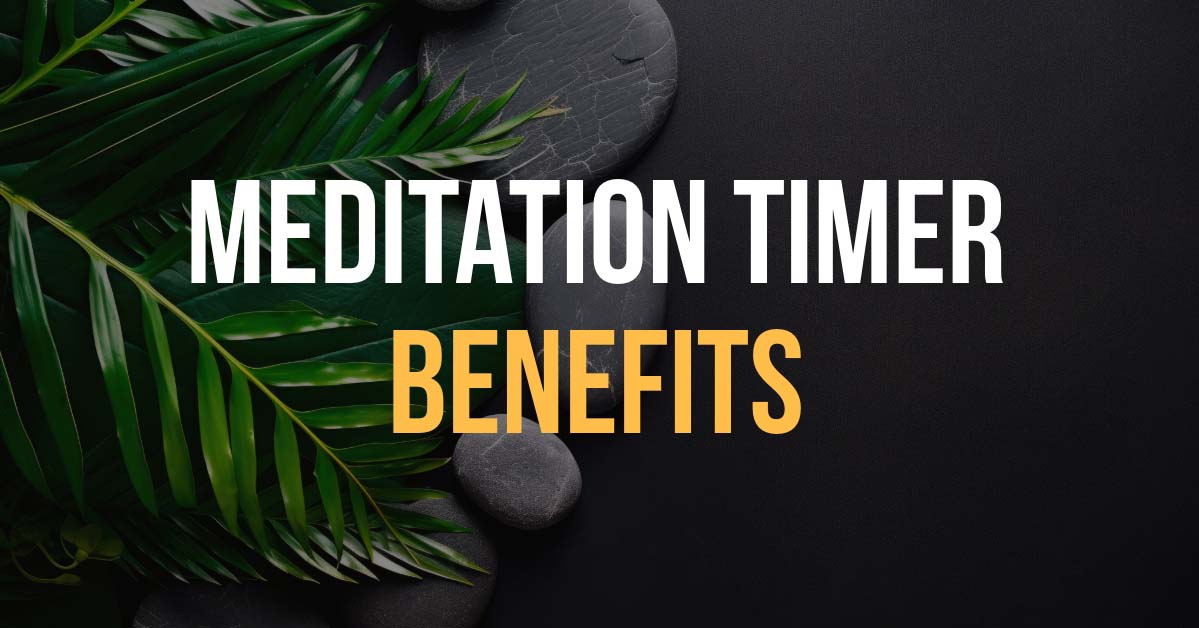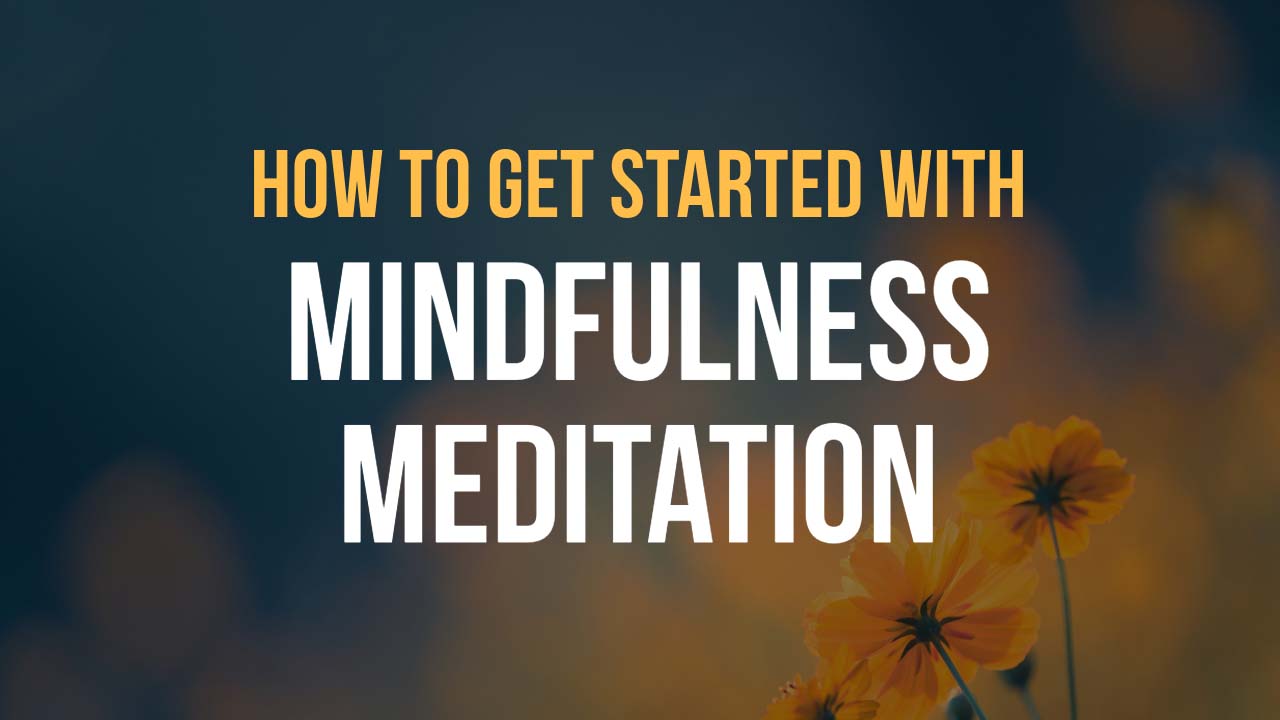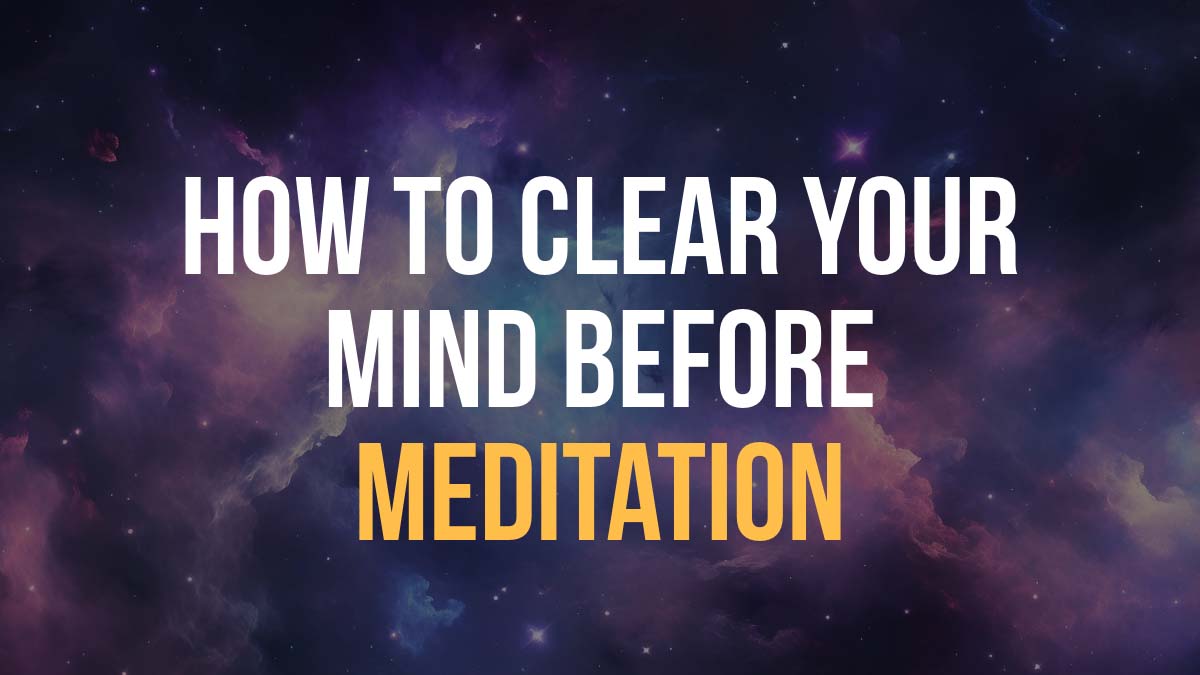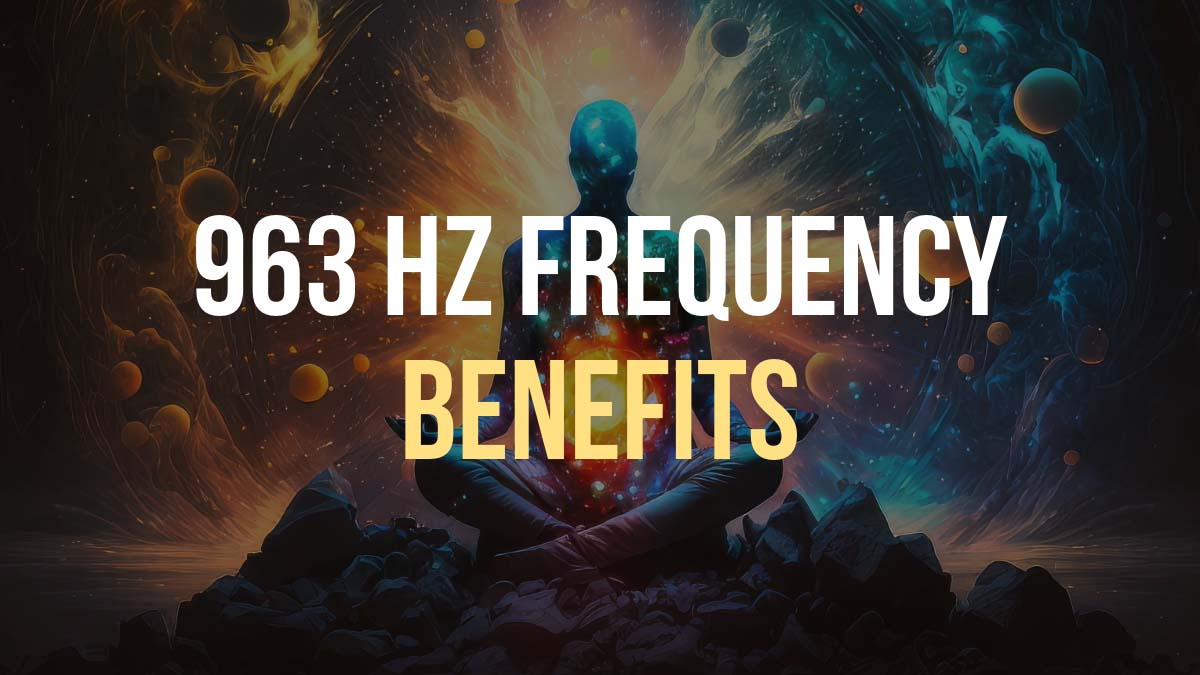Meditation Types List: Choose What’s Best For You
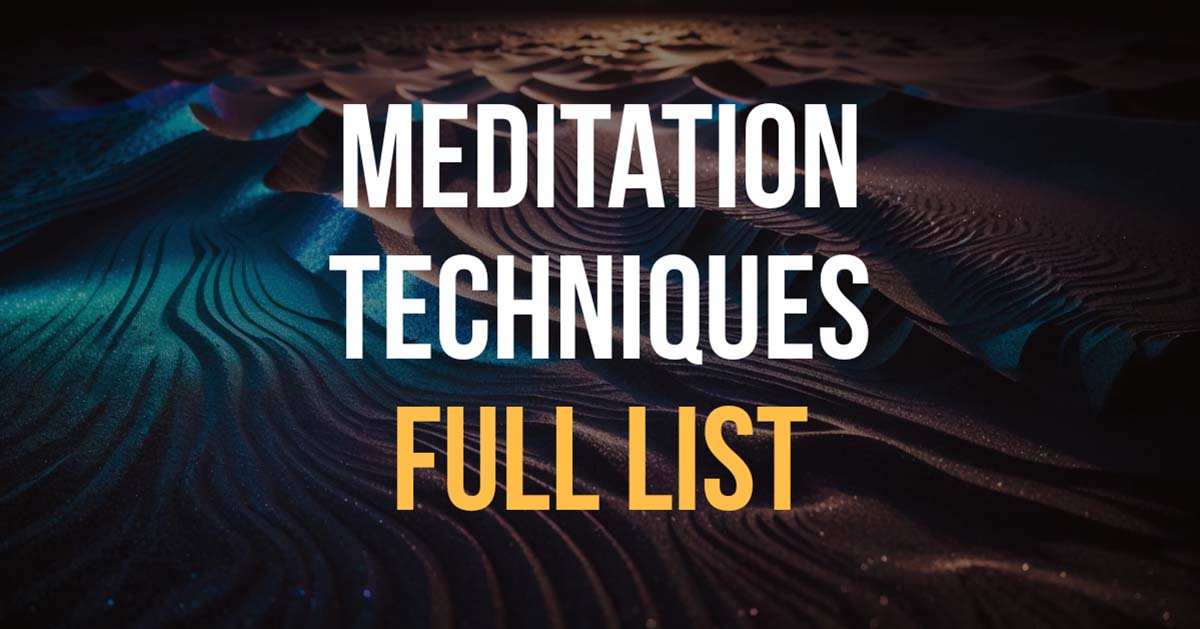
Many of our clients ask the same question:
With so many different meditation types available which one is best for me?
The generic answer is try as many as you can and learn what works for you.
Of course, if you’re a seasoned meditation practitioner you must have tried most of the known techniques by now.
But what if you’re only starting your meditation journey?
You wouldn’t want to spend countless hours trying each and every type of meditation out there.
We hope this guide will help you understand the available meditation types to jump start your meditation journey.
Keep reading!
We will keep updating this post as we research more types and techniques. Make sure to sign up for the newsletter!
Does it matter for a beginner which meditation technique to use?
Yes, it can matter quite a lot, as different techniques can suit different personalities, goals, and comfort levels.
Your lifestyle and preferences matter too.
Do you prefer to meditate in the morning to set the mood for the day?
Or would you rather meditate in the evening to relieve the stress after a long day?
Or maybe you simply want to catch a short rejuvenating break during the busy day at the office?
Choosing a technique that feels comfortable and interesting can help maintain motivation and consistency, which are key for developing a sustainable practice.
Do I need to meditate with music?
That’s one of the most commonly asked questions we hear, especially from beginners.
Ultimately, whether to meditate with music or not depends on your personal preference and meditation goals.
Music can enhance relaxation and assist beginners by providing a soothing background that eases the practice. Especially if you use a meditation timer, already set to predefined duration or if you follow a guided meditation with music.
However, traditional meditation often emphasizes silence to foster a deeper focus and reduce distractions.
Experimenting with both options can help you discover what’s best for you.
If you’d like to try meditation with music, we recommend starting with subtle background tracks (so there’s no prominent melody) and tuned to one of the healing or solfeggio frequencies.
Meditation techniques, full list (updated)
Here’s our attempt to categorize known meditation techniques.
We try to keep it brief, while giving you enough details for making the informed decision as to which technique may fit your lifestyle and wellness goals.
1. Mindfulness Meditation
Focuses on being intensely aware of what you’re sensing and feeling in the moment, without interpretation or judgment.
Suitable for beginners?
Highly suitable; easy to start with simple awareness exercises.
Lifestyle fit
Flexible; can be integrated into daily routines.
Here’s an example of a simple mindfulness meditation for beginners:
Benefits
Stress reduction, enhanced self-awareness, emotional regulation.
Download more mindfulness meditation scripts.
2. Breathing Meditation
Involves focusing on the breath to calm the mind and relax the body.
Suitable for beginners?
Suitable; focuses on basic breath control.
Lifestyle fit
Versatile; can be practiced anytime, anywhere.
Benefits
Stress reduction, improved focus, better sleep, emotional balance.
Here’s an example Powerful 5 Min Breathing Meditation script.
3. Diaphragmatic Breathing meditation
Deep breathing involving the diaphragm.
Suitable for beginners?
Suitable; easy to learn and practice.
Lifestyle fit
Suitable for relaxation breaks.
Benefits
Relaxation, reduced heart rate, anxiety management.
4. Box Breathing (Square Breathing) meditation
Inhaling, holding, exhaling, and holding the breath again, each for the same count.
Suitable for beginners?
Suitable; simple and structured.
Lifestyle fit
Good for structured breaks or before stressful events.
Benefits
Stress reduction, focus, calmness.
5. 4-7-8 Breathing meditation
Inhale for 4 seconds, hold for 7 seconds, and exhale for 8 seconds.
Suitable for beginners?
Suitable; easy pattern to follow.
Lifestyle fit
Great before bedtime or during stressful times.
Benefits
Promoting sleep, reducing anxiety.
6. Alternate Nostril Breathing (Nadi Shodhana) meditation
Alternating the breath between the nostrils.
Suitable for beginners?: Suitable; may require initial guidance.
Lifestyle fit
Complements yoga practice.
Benefits
Energy balance, improved focus, relaxation.
7. Progressive Relaxation
Also known ans progressive muscle relaxation (PML). Deep inhales and exhales while progressively tensing and relaxing different muscle groups.
Suitable for beginners?: Suitable; easy to follow guided practices.
Lifestyle fit
Ideal for evening relaxation or stress relief.
Benefits
Muscle relaxation, stress reduction.
Here’s an example of the progressive relaxation meditation:
8. Transcendental Meditation
Involves silently repeating a personal mantra to achieve profound rest and relaxation.
Suitable for beginners?
May require instruction; suitable with guidance.
Lifestyle fit
Structured, regular practice.
Benefits
Deep relaxation, stress reduction, spiritual growth.
9. Guided Meditation
Following the experienced guide (either recorded or in person) who walks you through the exercise.
Suitable for beginners?
Highly suitable; easy to follow with recorded guides.
Lifestyle fit
Flexible; fits into various times of the day.
Benefits
Relaxation, stress relief, mental imagery practice.
Learn more about benefits of guided meditation.
Download our Best Guided Meditation Scripts Collection (15 Scripts Bundle).
10. Vipassana Meditation (Insight Meditation)
A traditional Buddhist practice focusing on deep, concentrated self-observation.
Suitable for beginners?
Suitable; might need initial guidance.
Lifestyle fit
Best with dedicated practice time.
Benefits
Self-observation, insight, mindfulness.
11. Loving-Kindness Meditation (Metta Meditation)
Involves directing well-wishes towards others and oneself.
Suitable for beginners?
Suitable; easy to start with guided sessions.
Lifestyle fit
Integrates well into daily or weekly routines.
Benefits
Compassion, emotional resilience, positive outlook.
See the example of this type of meditation here: Loving Kindness (Meditation Script)
12. Chakra Meditation
Focuses on body points to facilitate clearing and balancing energy centers.
Suitable for beginners?
Suitable but requires some learning about chakras.
Lifestyle fit
Complements holistic or spiritual practices.
Benefits
Energy balance, spiritual alignment, emotional healing.
Give it a try with this Chakra Balancing For Positivity (Meditation Script).
You can also listen to Chakra frequencies for amplified effect:
13. Yoga Meditation
Various forms including Kundalini, Hatha, and more, focusing on breathing patterns while performing physical postures.
Suitable for beginners?
Suitable; often combined with physical yoga practice.
Lifestyle fit
Ideal for those with a regular yoga routine.
Benefits
Physical and mental balance, relaxation, spiritual growth.
14. Zen Meditation (Zazen)
A form of seated meditation foundational in Zen practice.
Suitable for beginners?
Suitable; may require guidance initially.
Lifestyle fit
Best with a structured, regular practice.
Benefits
Mindfulness, calmness, spiritual insight.
15. Qigong Meditation (Chi gong)
Combines meditation, relaxation, physical movement, and breathing exercises to restore and maintain balance.
Suitable for beginners?
Suitable; involves simple movements.
Lifestyle fit: Integrates well with gentle physical activity.
Benefits
Energy balance, relaxation, physical well-being.
16. Christian Meditation
Focuses on forming a close relationship with Jesus through prayer and silence.
Suitable for beginners?
Suitable; often involves familiar practices like prayer.
Lifestyle fit
Fits well with religious or spiritual routines.
Benefits: Spiritual growth, closeness to faith, inner peace.
17. Taoist Meditation
Methods include concentration, visualization, and breathing techniques.
Suitable for beginners?
Suitable; requires some initial learning.
Lifestyle fit
Complements holistic or spiritual practices.
Benefits
Spiritual insight, energy balance, relaxation.
18. Gazing Meditation (Trataka)
Focuses on a single visual point such as a candle flame or symbol to enhance concentration.
Suitable for beginners?
Suitable; simple to practice.
Lifestyle fit
Best with quiet, undisturbed time.
Benefits:
Enhanced concentration, focus, mental clarity.
Take a look at our collection of focus meditations.
19. Movement Meditation
Includes walking meditation or other gentle movements practiced mindfully.
Suitable for beginners?
Highly suitable; involves natural movement.
Lifestyle fit
Ideal for active individuals.
Benefits
Mindfulness, physical health, relaxation.
Download free walking meditation.
20. Sound Meditation
Involves listening to calming sounds like nature sounds or singing bowls to focus the mind.
Suitable for beginners?
Suitable; easy to follow with sound recordings.
Lifestyle fit
Complements relaxation routines.
Benefits
Relaxation, mental focus, emotional balance.
21. Music Meditation
Uses music as the focal point for meditation to cultivate mindfulness and relaxation.
Suitable for beginners?
Suitable; involves listening to music.
Lifestyle fit
Fits well with daily relaxation time.
Benefits
Emotional well-being, stress reduction, mindfulness.
22. Grounding Meditation
Focuses on reconnecting one’s body and mind to the earth, using visualization exercises to counteract anxiety or detachment.
Suitable for beginners?
Suitable; easy to start with guided exercises.
Lifestyle fit
Best during quiet times.
Benefits
Anxiety reduction, emotional stability, present-moment awareness.
Want to learn more about grounding meditation? Check out this Meditation Script For Profound Grounding.
23. Visualization Meditation
Involves forming mental images to relax or improve focus, used for goal-setting, healing, or manifesting desires.
Suitable for beginners?
Suitable; easy to follow guided imagery.
Lifestyle fit
Flexible; fits into various times of the day.
Benefits
Relaxation, goal-setting, mental clarity.
24. Affirmation Meditation
Involves repeating positive affirmations to cultivate a positive mindset and manifest desired outcomes.
Suitable for beginners?
Highly suitable; simple and easy to practice.
Lifestyle fit
Flexible; can be practiced at any time, especially beneficial as part of a morning or bedtime routine.
Benefits
Improved self-esteem, positive thinking, motivation, goal achievement.
Here’s a good example of prosperity affirmations: Powerful Intentions For Prosperity And Abundance
25. Sleep Meditation
Uses guided imagery, relaxing sounds, or breathing techniques to promote restful sleep.
Suitable for beginners?
Highly suitable; simple to follow guided sessions.
Lifestyle fit
Best practiced before bedtime to improve sleep quality.
Benefits
Better sleep, reduced insomnia, relaxation, reduced anxiety.
25. Body Scan Meditation
Involves mentally scanning the body from head to toe, paying attention to physical sensations in each area.
Suitable for beginners?
Highly suitable; straightforward to practice.
Lifestyle fit
Ideal for relaxation breaks or before bedtime.
Benefits
Increased body awareness, stress reduction, relaxation, improved mindfulness.
Learn more about body scan meditations, how to get started, and see examples of body scan meditation scripts.
26. Gratitude Meditation
Involves focusing on and feeling gratitude for the positive aspects of life.
Easy for beginners?
Highly suitable; simple and uplifting to practice.
Lifestyle fit
Can be practiced at any time; particularly effective in the morning or before bed.
Benefits
Enhanced positivity, increased happiness, reduced stress, improved emotional resilience.
Browse some of our best gratitude meditation scripts.
How to choose the best meditation type or technique?
Choosing the best meditation technique for yourself involves considering a few key factors:
Personal Goals
Identify what you want to achieve through meditation—stress reduction, improved concentration, spiritual growth, etc.
Lifestyle Compatibility
Consider how much time you can dedicate to meditation and whether the technique fits your daily routine.
Comfort with the Technique
Some people may prefer techniques involving movement, such as walking meditation, while others might find peace in stillness, like in mindfulness or Zen meditation.
Guidance and Accessibility
Look for a technique that offers accessible resources, such as classes, examples or online tutorials, especially if you are a beginner.
Experimentation
Try different methods to see which one resonates with you the most. Sometimes, personal experience is the best guide in choosing the most effective meditation practice for your needs.
Reflecting on these factors and experimenting with various techniques can help you find the meditation practice that best suits your individual needs and preferences.
Did we miss any meditation types?
Feel free to let us know by posting a comment below!



